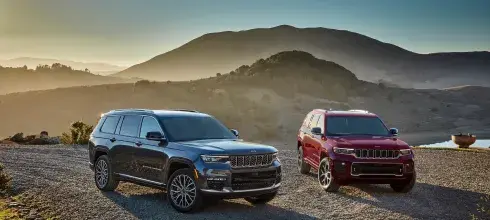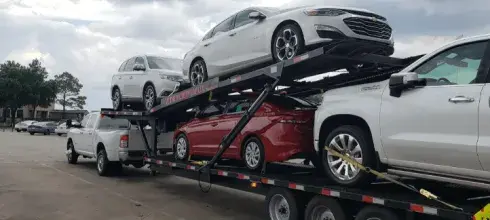
Auto Transport for Car Shows - A Guide to Vehicle Transport Insurance
Every year there are hundreds of car shows taking place across the country. Attending these car shows is part and parcel of owning a classic, antique, custom, or sports car, but unfortunately, the shows aren’t always on your doorstep. Here’s a short list of some of the car shows taking place this year:
- Twin Cities Auto Show (St. Paul, MN): March 31-April 8
- New York International Auto Show: April 7-16
- Monterey Car Week: August 11-20
- Pebble Beach Concours d’Elegance: August 20
- North American International Auto Show (Detroit, MI): September 13-24
- Miami International Auto Show: October 15-23
- Los Angeles Auto Show/Automobility LA: November 17-26
If you’re lucky enough to live within driving distance of one of these events, there’s no problem getting there with your precious vehicle. However, what will you do if the event you want to attend is several hundred miles away?
Classic car transport with a reliable auto transport company is an affordable, convenient, and safe option. It’s far safer than driving your vintage car on the highway. It’s often much cheaper in the long run as well.
We can already hear you questioning the suitability of such an option, and that’s why we’re writing this post. We completely understand that you’re worried about the safety of your car. It's your prized possession and you want it treated with the utmost care and attention.
Car shipping services are the most reliable, safe, and secure way to ship a car across the country and thanks to vehicle transport damage insurance, your valuable vehicle is protected every step of the way.
We should point out that the chance of anything happening to your Pontiac Firebird is minimal. Nevertheless, it should put your mind at rest knowing your Chevy Camaro is fully covered by transport vehicle insurance.
What is vehicle transportation insurance?
You’ll find it called many different names such as auto transport insurance, carrier insurance, cargo insurance, and vehicle transport insurance but they are basically all the same.
Auto transport companies are legally required to carry insurance. Insurance covers any damage to the vehicles while they’re in transit. Auto transport insurance coverage requirements vary by state and also by carrier, so it pays to ask for a company’s insurance policy details.
You need to verify that the insurance covers the pick-up, transport, and delivery of your vehicle. Some car shipping companies only include coverage once your vehicle has been loaded onto their trailer. There’s also the possibility that the policy has exclusions. These might complicate any claim should your vehicle sustain any damage during transit.
Important insurance terms you need to know
You’ll find the issue of auto shipping insurance easier to understand if you familiarize yourself with some key terms:
- Carrier: This is the company that transports your vehicle. They are also called the auto hauler, car shipper, transport carrier, or car carrier.
- Broker: This is a company that connects a customer with a carrier. They are not responsible for shipping your car.
- Auto transport management company: This is similar to a broker but a far more personalized service is offered. This type of company takes care of everything on your behalf, from finding a carrier to making the arrangements and keeping you informed throughout the car shipping process.
- Supplemental: Supplemental is another word for extra. Sometimes, brokers offer supplemental coverage.
- Licensed carrier: To legally transport vehicles, a carrier needs to be licensed.
- MC number: This is a number assigned to an auto transport company. It gives the company authority to operate and take vehicles across state lines.
- USDOT number: USDOT stands for US Department of Transport. This number is a government tracking identifier that's given to auto transport companies. You can check a company’s history online.
How does insurance for transporting vehicles work?
An auto transport company’s insurance typically covers any damage that might occur when loading your car, during transit, or when unloading your car. Anything else, such as damage caused because your vehicle was in poor shape when you shipped it, is your responsibility. This might include loose parts, leaking oil, or similar damage.
No two auto shipping insurance policies are the same. It’s therefore critical that you ask for the insurance policy before you make your booking and read the fine print carefully.
How much does auto transport insurance cost?
Generally, you shouldn’t have to pay any additional fees for auto transport insurance. Here at SGT Auto Transport, we make no extra charges for insurance. The car shipping quote you receive from us is fully inclusive. There is nothing extra to pay and that’s guaranteed.
Things you should know about insurance for the transport of vehicles
Insurance coverage is a complicated business with many loopholes and omissions that might trip you up. It’s therefore important that you’re clear about where you stand and what the process is should there be any problems.
We think it’s important to provide our customers with all the necessary information. Only then will your auto transport service be the best experience possible. When we take care of our customers we can be confident they’ll come back for more.
As the owner of a classic, custom, antique, vintage, or sports car, we know you want the best for your baby. Take note of the following so you can get your car shipped to the next show without any unexpected hassles and costs.
Ask the car shipping company for proof of insurance
Car shipping companies have to carry valid insurance certification by law. Therefore, there should be no problems if you ask for a copy of the policy. When you make your booking, this is the perfect time to ask questions relating to the policy, just to make sure you’re clear and understand the details.
Ask whether the policy covers any damage that occurs during the shipping process. Is the entire car covered or just certain parts? Should there be any damage, will you be required to pay a deductible?
Request all the details in writing
Before you finalize your booking, ask for everything in writing. This includes any special agreements or considerations. When you’ve got everything in writing, you’re protected should something unforeseen happen. This is particularly relevant if you’re receiving a service or agreeing to something that’s not included in the company’s regular contract.
Check with your insurance company
You should also check your insurance policy because it may cover your vehicle while it’s in transit. However, this doesn’t apply to all insurance policies, so don’t assume it’s so for yours.
Contact your insurance company and ask whether or not the same coverage applies while your vehicle is being shipped. Inquire whether you need to supply the insurance company with some kind of notification from the shipping company.
Remove any loose items from inside the vehicle
It is common practice that damage to a vehicle’s interior is not covered. To reduce the risk of something happening, you should remove all loose items from inside your car before handing over the keys to the carrier.
Items you should remove include removable electronics, CDs or cassettes, loose change, and anything else that could become airborne. If you reduce any loose items, you’re also reducing the risk of a break-in theft. This is something else that’s generally not covered by most shipping companies.
Pre-possession inspection
Before the car shipping company loads your vehicle onto the trailer, they will perform a thorough inspection of it and make a note of any existing damage. It is your legal right to be there when this is done so you can check the details. It’s also a good idea to take photographs of your vehicle from many different angles. This will be a good record of its condition before the shipping company takes possession of it.
The Bill of Lading
Any pre-existing damage is recorded on the Bill of Lading. When your vehicle is delivered to its final destination, the Bill of Lading becomes a condition report.
Upon delivery, check your vehicle thoroughly, including the undercarriage. You should also start the engine to check for any mechanical damage.
If the vehicle is delivered at night, make sure you inspect it under bright lights. It’s important that you can see as much as possible. Once you sign off on the Bill of Lading, the transfer is complete. If you missed something, the auto transport company won’t be liable.
Should you find any signs of damage, note it on the Bill of Lading and ask the driver to sign it off.
What to do if your car is damaged during car transport
Every car shipping company will have a different process. Here at SGT Auto Transport, we generally suggest the following:
- Note any damages on the Bill of Lading
- Make sure you receive a copy of the delivery Bill of Lading from the carrier
- Take detailed pictures of your vehicle and the damaged areas
- Contact us at (864) 546-5038 to request a copy of the carrier’s Certificate of Insurance
- Submit a claim to our dedicated Claims Department by email to [email protected]
Choosing the right auto transport service
When it comes to car shipping services, there are two options: open car shipping and enclosed auto transport. Choosing the right one makes a big difference if you want to minimize the risk of damage, particularly in the case of rare, custom, classic, antique, vintage, luxury, or sports cars.
We will always recommend that you choose enclosed or covered car transport. It provides the maximum amount of protection for your car. The cost is around 30% to 40% higher than open car shipping, but can you put a price on your peace of mind?
Open car shipping might be cheaper, but your Shelby AC Cobra or Ford Model T will be exposed to the weather, traffic grime, and road debris. It might also need cleaning when it arrives at the car show. Nobody is going to be looking at your car if it’s covered in dust and grime from the journey.
With enclosed auto transport, on the other hand, your priceless vehicle is transported in a trailer that’s enclosed on all sides. Your vehicle is protected from the elements and any traffic grime.
For most car owners, standard open car shipping is more than adequate. However, car owners who are shipping their cars to a show require a certain level of care and attention. The vehicle being shipped is completely protected and when it arrives at its final destination, it’s just as shiny and new-looking as when the carrier picked it up.
The benefits of enclosed auto transport
- Increased insurance coverage: Vehicles that are shipped in enclosed trailers tend to be of higher value. The insurance coverage offered by a carrier is often much higher.
- Low ground clearance: It’s more usual for enclosed shipping carriers to use hydraulic lift gates and extended racing ramps for loading and unloading cars. This is ideal if you want to ship a car with low ground clearance.
- Multiple-vehicle shipping: If you’ve got more than one classic car you want to ship, enclosed car shipping companies can usually accommodate your needs.
- Peace of mind protection: Peace of mind is guaranteed with enclosed car shipping. You know your car will arrive as clean as when you waved goodbye to it at the pickup point. It’s fully protected throughout its journey from the weather, dirt, dust, and other traffic grime. It’s also safely locked away from prying eyes.
Getting your vehicle ready for shipping
When you're shipping your car to the latest show there are some things you can do ahead of time to ensure a smooth service.
- Clean the interior and exterior of your car.
- Remove all unnecessary items from inside and outside the vehicle.
- Don’t fill the gas tank to any more than one-quarter full.
- Make sure all windows are closed and locked so that no one can break into them.
- Check the battery is not leaking and if it's a standard car, not an electric one, it must be fully charged. If you're shipping an EV, the cells or battery packs should be at a 45% - 65% state of charge for safety reasons.
- Check tires and brakes are fully inflated and in good condition.
- Disconnect any loose wiring that could get caught.
If you know there’s a car show coming up that you want to attend, arrange all the details for your car shipping service now, and you can ask the organizers to reserve you a place.
Our shipping advisors can be contacted at (864) 546-5038 or you can use our Live Chat option. Ask them any questions about the car shipping services we provide and put your mind at rest.
FAQs
Why do we need insurance in shipping?
Shipping insurance is vital because it can cover items that are lost, damaged, stolen, or in certain cases, delayed. The cover is typically up to the value of the products in addition to the shipping cost.
Do I need freight insurance?
You are under no obligation to buy cargo insurance. If you’re shipping a car, cargo insurance is included as part of the service.
How does cargo insurance work?
Cargo insurance is a way of protecting shipments from physical damage or theft.
What is insurance of goods during transportation?
Insurance of goods during transportation gives you peace of mind that should something go wrong in transit, you’ll receive compensation.
Do you need insurance when shipping a car?
In general, if you’re not going to be driving your car, you might not be required to insure it when it’s being transported by truck, ship, or rail. Ideally, you should choose a carrier that has adequate insurance to cover any damage that might occur to your car.







